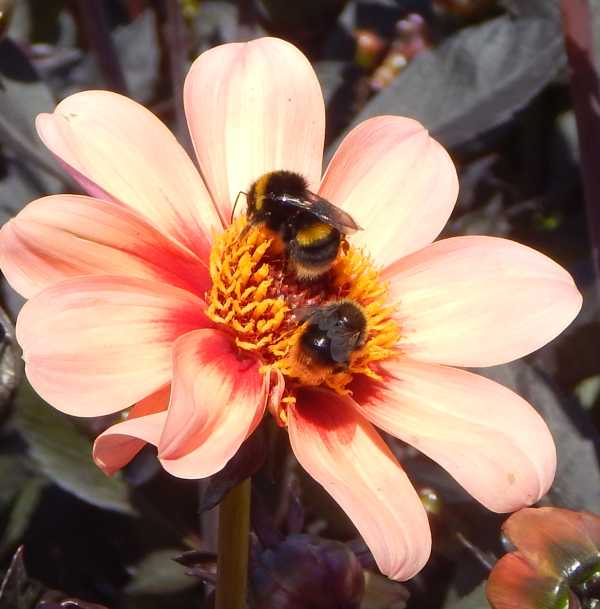Bees And Pollution:
Air Pollution Impairs Foraging
Can chemical pollutants in the air harm bees? In 2016, scientists examined this topic.
How Air Pollution Harms Bees
A study published in 2016 by Fuentes et al1 at Pennsylvania State University, found that air pollutants alter floral scent molecules and can harm the ability of insects to detect floral scents. This increases the time that insects spend locating target plants, thus also increasing the time spent foraging.
The scientists suggest that this change in foraging behaviour may have a negative effect on pollinator health by reducing the amount of time devoted by insects to other essential task.
Fuentes and his team started by setting out the already established fact that air pollutants such as ozone, nitrate radicals and hydroxyl radicals are known to interact with floral scents to the extent that, downwind of the scents, their composition is radically altered.
They then went on to investigate two aspects of
this problem:
- what level of pollution is required to cause chemical alteration of floral scent plumes?
- what is the impact on insect search behaviour of the changes in floral scents?
How might bees and other pollinators be affected by pollution?
Pollutants such as ozone, nitrate radical and hydroxyl radical are responsible for "the degradation and the chemical modification of scent plumes."
Bees pick up scent molecules from flowers at distance, thus enabling them to locate sources of food, and thus pollinate flowers.
Unfortunately, the researchers found that the pollutants have the effect of reducing the distance that scent molecules can spread. This means it becomes harder for bees to locate flowers, with the knock on effect that foraging times are increased.
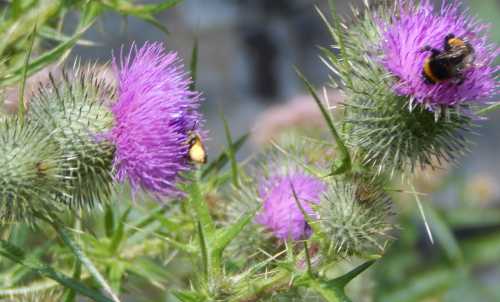 Bees on thistles.
Bees on thistles.The team established two things:
- Even moderate pollution levels cause a significant change in
floral scent distribution;
The study showed that even a moderate level of air pollutant at 60 parts per billion of ozone, can make it harder for bees to locate flowers. - Insect success rates in locating floral scent plumes were reduced and the time spent foraging was increased.
"...... insect success rates of locating plumes of floral scents were reduced and foraging times increased in polluted air masses due to considerable degradation and changes in the composition of floral scents.
Results also indicate that plant-pollinator interactions could be sensitive to changes in floral scent composition, especially if insects are unable to adapt to the modified scentscape.
The increase in foraging time could have severe cascading and pernicious impacts on the fitness of foraging insects by reducing the time devoted to other necessary tasks."
Why should we be concerned about bees and pollution levels?
Firstly, it is known that atmospheric pollution has
increased over many decades, with some major cities such as Mexico City, and
Houston reporting very high levels of pollution, especially of ozone, which
is a pollutant also known to be hazardous to human health.
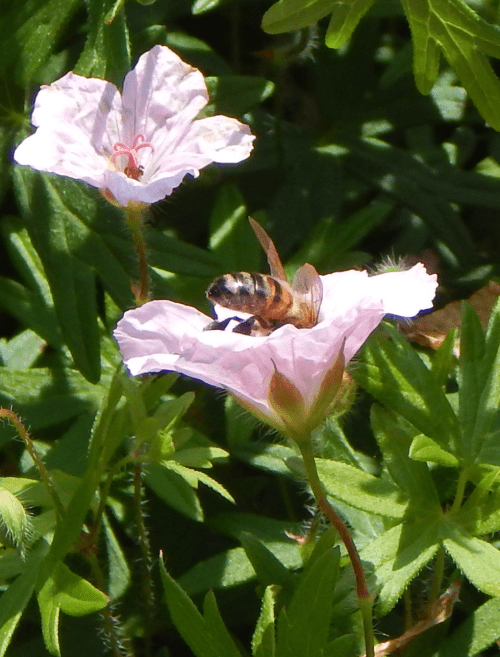 Honey bee Apis mellifera foraging on geranium.
Honey bee Apis mellifera foraging on geranium.
Other major cities, such as London are known to be suffering from high levels of pollution.
The scientists have shown that this increase
in level of air pollutants is changing the nature of floral scent distribution
– the floral scents themselves are being altered. If this affects plant-pollinator interactions, what are the consequences for plant populations and the wider eco-system?
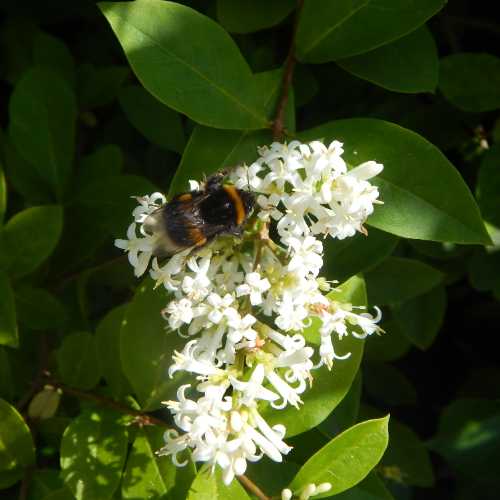 Buff-tailed bumble bee Bombus terrestris on common privet.
Buff-tailed bumble bee Bombus terrestris on common privet.In addition to impaired foraging efficiency suggested by the scientist, I would also add that additional time spent out of the nest potentially increases exposure to predators, and uses more of the bees' (or other insects') energy reserves.
In using more of the bees' energy reserves for foraging, one wonders about the impact on the general health of the bees.
For example, what might be the impact on newly emerged solitary bees and queen bumble bees that have limited time for foraging, establishing nests/colonies and for new queens needing to lay down fat reserves to see them through the winter months?
What can we do to protect bees from pollution?
A very difficult question! There is the longer term issue of tackling the pollution, and a short term need to help the bees that need to thrive from one year to the next.
Of course, governments need to be lobbied. It may seem like an impossible task, but there have been periods in history - London again springs to mind, when legislation to clean up the air has been a necessary step, and industry has had to adapt.
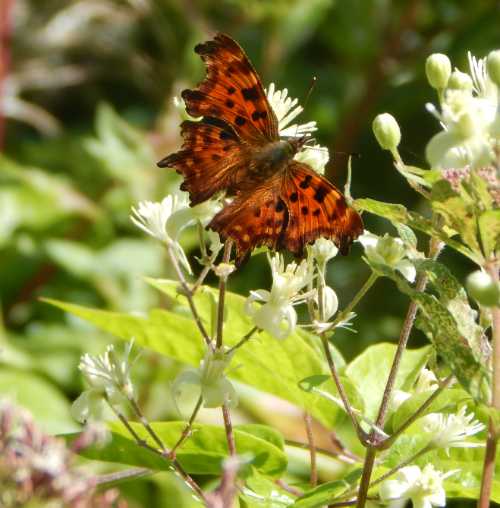 Comma butterfly on old man's beard.
Comma butterfly on old man's beard.Individually, we also need to consider our own footprint upon the earth, and those who live in cities, perhaps more so.
However, we can certainly ask councils in major cities to up their game in providing more plants, trees and hedgerows for pollinators in public planting schemes, instead of garish, low-value ornamentals.
Home owners with gardens, communities, even churches and community centres with grounds, could all be asked to play their part in providing plants for bees.
Reference:
1. Air pollutants degrade floral scents and increase insect foraging times; Jose D. Fuentesa; Marcelo Chameckib; T’ai Roulstonc; Bicheng Chena; Kenneth R.Pratt; Atmospheric Environment Volume 141, September 2016, Pages 361-374
If you found this page helpful or interesting, I'd really be grateful if you would share it with others - if not this page, perhaps another, such as Gardening For Bees.
Thank you so much :) .
